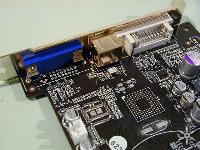After careful consideration I have decided to transfer all hardware review activities to a new domain. I purchased Hardwareasylum.com in 2012 and have been working hard to build a new and improved Ninjalane on that domain. If you are reading this you have reached one of the archived articles, news, projects and/or reviews that were left behind during the site migration.
Please update your bookmarks and be sure to visit the new and improved Ninjalane at Hardwareasylum.com
Chaintech Apogee 5700 Ultra Video Card Review
Author: Dennis Garcia
Published: Tuesday, March 09, 2004
Introduction
The market for mid-range video cards is very fierce and though many hardware enthusiasts shy away from mid-range video cards the greater population finds the price for performance ratio to be very appealing, not to mention it's not uncommon to also get a very overclockable piece of hardware.
The focus of this review will be around the nVidia GeForceFX 5700 Ultra offering from Chaintech. As some of you may know the FX5700 is a replacement chip for the 5600 that comes with a variety of upgrades in performance and hardware offerings.
GeForce FX5700 Ultra Specs
GeForce FX5700 Ultra
0.13u process technology
128-bit advanced memory interface
128MB DDR2 SDRAM
256-bit graphics architecture
475 MHz engine clock
900 MHz memory clock
356 Million vertices/ sec
1.9 Billion texels/ sec fill rate
14.4 GB/sec memory bandwidth
4 pixels per clock rendering engine
16 texels per pixel with 8 textures applied per clock
NVIDIA CineFX 2.0 Engine
0.13u process technology
128-bit advanced memory interface
128MB DDR2 SDRAM
256-bit graphics architecture
475 MHz engine clock
900 MHz memory clock
356 Million vertices/ sec
1.9 Billion texels/ sec fill rate
14.4 GB/sec memory bandwidth
4 pixels per clock rendering engine
16 texels per pixel with 8 textures applied per clock
NVIDIA CineFX 2.0 Engine
The Apogee AA5700U is based on the nVidia reference design and features a rather large 2 fan copper heatsink and Chaintech branded heat spreader on the back. The PCB is dark brown in color so it really won't match anything but another Chaintech product or a Sound Blaster Audigy. (note: I don't actually condone the use of Sound Blaster cards, though if your into that sort of thing then go ahead  )
)
Video connectors on the Apogee AA5700U consist of a single 15-pin D-sub VGA, a single DVI-I and a 4 pin S-Video port. The video board has been screened to accept all of the commonly available FX5700 features like Dual DVI-I and VIVO processor. Dual DVI is one of those options that you normally find on high-end workstation cards though it has started to gain some traction in the mainstream video market. Even though its usefulness is still limited to those with LCD panels it wouldn't surprise me if more companies start to implement Dual DVI on their cards in the near future.





